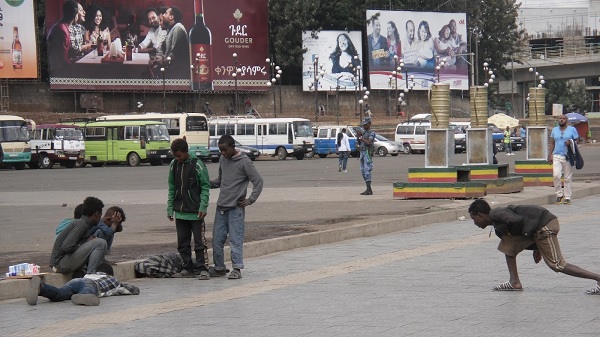
Street children, especially young boys, have been increasingly visible in Addis Ababa in recent years. Thousands ply their trade at the city’s traffic-choked intersections.
By Tom Gardner (The Guardian)
Behind Addis Ababa’s most iconic public space, Meskel Square, down a cobblestone alleyway in the shadow of half-finished high-rises, lies a small corner of the Ethiopian capital known by locals as “DC”.
Nestled between cramped brothels and dimly lit bars, it consists of low-slung, tin-roofed dwellings containing rows of bunk beds. Each night, hundreds of homeless children come looking for a place to sleep, sometimes two to a mattress.
One house, run by 27-year-old Mabit and her family of six, hosts about two dozen children a night. She charges them 20 birr (50p, i.e., British 50 cents) each, and cooks food to sell to them. The dormitories are damp and crowded, and some of the boys can be drunk and violent, but it’s better than a night on the street.
“It’s like America,” says Mabit, explaining the district’s nickname. “It’s a better place for the boys.”
Street children, especially young boys, have been increasingly visible in Addis Ababa in recent years. Thousands ply their trade at the city’s traffic-choked intersections, some hawking cigarettes and chewing gum, others begging. Many clutch plastic bottles filled with glue from which they take regular sniffs.
The last official survey was conducted as far back as 2010, but even then there were an estimated 12,000 children living unaccompanied on the streets of the capital. NGOs estimate much higher figures today. Mabit, who has been renting beds to children for a decade, also reckons the numbers are rising, a view echoed by officials.
“We have a very huge problem – and it’s getting bigger and bigger,” says Hunegnaw Ayele Abate, director of social protection at the city’s bureau of labor and social affairs.
Children as young as six come to the city to escape rural drudgery and, in many cases, family breakdown. “The reason is always poverty – but poverty plus [something else],” says Lynn Kay, country director of Retrak Ethiopia, an organization that rescues street children in Addis Ababa and reunites them with their families.
Read the complete story at The Guardian
